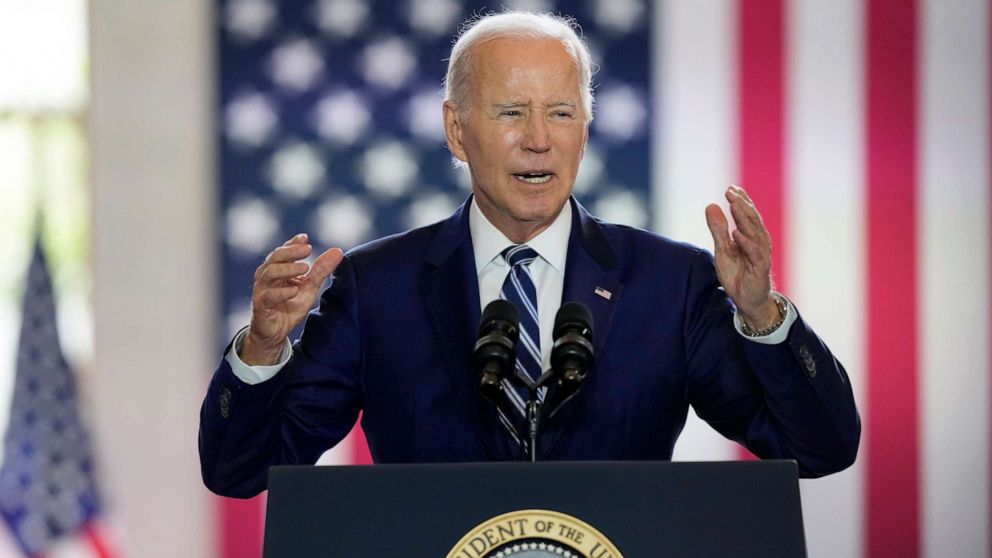白宫正在全力打造“拜登经济学”品牌2024选举循环升温。
总统乔·拜登周三,他在芝加哥市中心的旧邮局大楼发表了演讲,带着他的经济哲学上路了。他的经济哲学强调自中而外、自下而上地建设经济。
“涓滴法辜负了中产阶级,”拜登说。“它辜负了美国。”
尽管有账单,总统起初似乎对使用“拜登经济学”一词犹豫不决,认为这是新闻媒体首先创造的一个词。“这个名字不是我想出来的。我真的没有。我现在声称拥有它,但他们是第一个使用它的人,”他说。
“我认为这是一个我乐于称之为拜登经济学的计划,”他接着坚称,概述了一个三管齐下的方法,旨在让低收入和中产阶级家庭拥有更强大的财务状况。
“首先,在美国进行明智的投资。第二,教育和授权美国工人壮大中产阶级。第三,促进竞争,降低成本,帮助小企业。
在35分钟的讲话中,拜登吹捧两党基础设施法和通货膨胀削减法案创造的就业和投资。他将矛头指向共和党人,特别是阿拉巴马州参议员汤米·特伯维尔(Tommy Tuberville),因为他最近庆祝了基础设施法的影响,尽管他投票反对该法。
“我认为这将有助于缩小这个国家的分裂,让我们重新走到一起,”拜登对“拜登经济学”的人群说"当某些东西在起作用时,很难去煽动它."
白宫正式推动拜登的经济信息——重塑他多年来阐述的思想——正值民调显示,在经历了一年的持续通胀(最近有所缓解)和高利率后,总统在经济问题上受到选民的质疑。
共和党总统候选人经常在经济问题上攻击拜登,指责他通过大规模支出计划推高价格,并通过所谓的“醒来”政策损害企业。
一;一个ABC新闻/华盛顿邮报民意调查上个月,54-36%的美国人认为前总统唐纳德·特朗普在任时在处理经济方面比拜登做得更好。
拜登周三主要关注积极的经济消息,宣扬失业率在今年早些时候创下历史新低,通货膨胀率有所下降,尽管物价仍高于他上任时的水平。
拜登周三表示:“降低通胀仍是我的首要任务之一。”。他说,他降低处方药成本和取消垃圾费的尝试是为美国人提供更多财务喘息空间的两个例子。

2023年6月28日,乔·拜登总统在芝加哥旧邮局发表经济讲话。
查尔斯·雷克斯·阿波加斯特/美联社
政府最近受到5月份就业报告的鼓舞,该报告显示就业人数增加了339,000人,超出预期。与去年同期相比,5月份消费者价格上涨了4%,也比预期的要好,但低于去年超过9%的40年高点。
但如果经济恶化,这种品牌化可能会带来政治风险。
美联储主席杰罗姆·鲍威尔周三表示,美国经济“相当有弹性”鲍威尔说,衰退“仍然有可能”,但不是最有可能的情况。在通货膨胀方面,美联储主席说,美国在2025年之前不会达到2%的核心通胀目标,并且不排除加息以抑制价格。
拜登在离开白宫时说,他不认为会出现经济衰退。
展望未来,拜登发誓要继续为普及学前教育和免费大学而奋斗,并降低儿童保育成本,解决阻止富人“支付公平份额”的税收漏洞。
拜登说:“我不是在这里宣布经济上的胜利,但我们有一个计划,可以令人难以置信地迅速扭转局面。”。“我们还有更多工作要做。”
Biden touts 'Bidenomics,' downplays recession chances
The White House is going all in on "Bidenomics" branding as the2024electioncycle heats up.
PresidentJoe Bidentook his economic philosophy, which emphasizes building the economy from the middle out and bottom up, on the road with a speech Wednesday at the Old Post Office Building in downtown Chicago.
"The trickle-down approach failed the middle class," Biden said. "It failed America."
Despite the billing, the president seemed hesitant at first about using the term "Bidenomics" -- arguing it was one first coined by the news media. “I didn't come up with the name. I really didn’t. I now claim it but they're the ones who used it first," he said.
"I think it's a plan that I’m happy to call Bidenomics,” he then insisted, outlining a three-pronged approach aimed at placing low-income and middle-class families in a stronger financial position.
"First, making smart investments in America. Second, educating and empowering American workers to grow the middle class. And third, promoting competition to lower costs and help small businesses," he said.
In the 35-minute address, Biden touted the jobs and investments created as a result of the Bipartisan Infrastructure Law and Inflation Reduction Act. He took aim at Republicans, Sen. Tommy Tuberville of Alabama in particular, for recently celebrating the impacts of the infrastructure law despite voting against it.
"I think it’s going to help lessen the division in this country by bringing us back together," Biden told the crowd of "Bidenomics." "It makes it awful hard to demagogue something when it's working."
The official push by the White House on Biden's economic message -- a rebranding of the ideas he's articulated for years -- comes as polls show the president under water with voters on economic issues after a year of persistent inflation, which has recently eased, and high interest rates.
Republican presidential hopefuls frequently hit Biden over the economy, accusing him of fueling higher prices with big spending packages and harming corporations through so-called "woke" policies.
AnABC News/Washington Post polllast month found Americans 54-36% said former President Donald Trump did a better job handling the economy when he was in office than Biden has done so far.
Biden on Wednesday largely focused on positive economic news, touting the unemployment rate hitting a historic low earlier this year and a cooling in inflation, though prices remain higher than when he entered office.
"Bringing down inflation remains one of my top priorities," Biden said Wednesday. He said his attempts to bring down prescription drug costs and eliminate junk fees are two examples of providing Americans with more financial breathing room.
The administration's recently been buoyed by a May jobs report that showed payrolls grew by 339,000, beating expectations. Consumer prices rose 4% in May compared to a year ago, also a better figure than anticipated, and down from the 40-year high of more than 9% last year.
But the branding could carry political risk, if the economy worsens.
Federal Reserve Chair Jerome Powell on Wednesday said the U.S. economy has been "quite resilient." Powell said a recession "remains possible" but is not the most likely scenario. On inflation, the fed chairman said the U.S. won't meet the target 2% core inflation before 2025 and didn't rule out raising interest rates to tamp down prices.
Biden, when leaving the White House, said he doesn't believe there will be a recession.
Looking ahead, Biden vowed to continue fighting for universal pre-K and free college, as well as bringing down child care costs and addressing tax loopholes that prevent the wealthy from "paying their fair share."
"I'm not here to declare victory on the economy but we have a plan [that is] turning things around incredibly quickly," Biden said. "We have more work to do."






